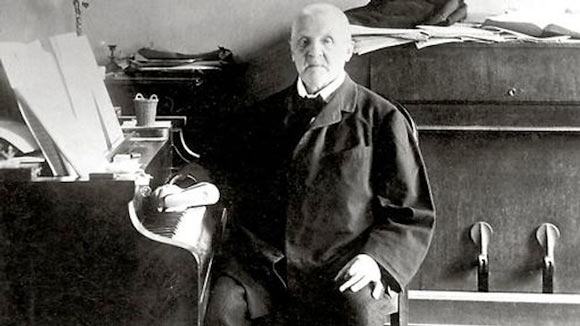
Anton Bruckner was an Austrian composer, schoolteacher and organist. He is credited for his highly technical romantic symphonies and for teaching highly acclaimed musicians such as Gustav Mahler and Franz Schmidt.
Anton Bruckner was born in Ansfelden, a village in Austria on the 4 September 1824. His ancestry was well known in Austria for their farming heritage. Bruckner’s father was a schoolmaster in Ansfelden, who taught Bruckner how to play the organ when he was only a child. Bruckner would also study music as part of his school’s curriculum. Soon Bruckner enrolled in another school in Horsching, where he studied music under Johann Baptist. Following his father’s death in 1837, Bruckner, then a thirteen year old boy, was sent to the Augustinian Monastery in Sankt Florian, where his organ and music skills were noticed. He then served as a teacher’s assistant in Windhaag in a desperate attempt to make ends meet, however, this position barely allowed him to work on his music skills, as he spent most of his time serving his teacher, Franz Fuchs. He then went on to work as a teacher’s assistant in Kronstaff an der Enns, where he finally found the opportunity to explore his music further.
While still in Horsching, Bruckner wrote his first composition, ‘Pange Lingua’. He also wrote some works in Windhaag and in Kronstaff which he would go on to revise later in his life. After his time in Kronstaff, Bruckner returned to Sankt Florian, where he remained an organist and a teacher for ten years, before finally meeting Simon Sechter. Bruckner studied counterpoint and music theory under Sechter, and then studied under Otto Kizler. Bruckner would soon start teaching music himself; he succeeded Sechter’s post as music teacher at the Vienna Conservatory, where he inspired students like Gustav Mahler and Franz Schmidt, who were soon to become the great musicians of the future. Bruckner wrote several works while working at the Conservatory, however, his music was not always received in the most positive light. He was often upset by music critics of his time, particularly Eduard Hanslick. This gave rise to another feature that he was very well known for, many of his works existed in multiple versions, for they were apparently revised to suit the demands of his critics. Bruckner’s symphonies were known for being highly technical and surprisingly unique. He achieved great fame because of his Seventh Symphony, and also the Fourth Symphony in E Flat Major. Bruckner revealed that he heard the first movement of his Seventh Symphony while he was dreaming, which he immediately wrote down as he woke. The second movement to his symphony was in tribute to the great Richard Wagner, who greatly inspired Bruckner with his profound opera music. Bruckner was also known for his mass compositions, both on organ and orchestra.
Anton Bruckner died on the 11 October, 1896 while still in Vienna. His legacy is engraved in the libraries of Vienna, having complete records of his works and revisions. He was decorated with the Order of Franz Joseph on July 1886 while the Anton Bruckner Private University for Music, Drama, and Dance was named in his honor.